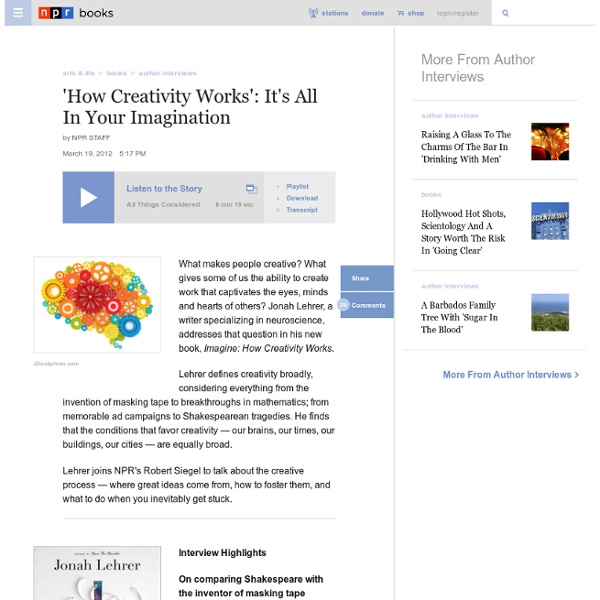12 Most Striking Tendencies of Creative People
Ever wonder what makes those wacky, creative types tick? How is it that some people seem to come up with all kinds of interesting, original work while the rest of us trudge along in our daily routines? Creative people are different because they operate a little differently. They:
How To Steal Like An Artist by Austin Kleon
Wednesday, March 30th, 2011 Buy the book: Amazon | B&N | More… Here’s what a few folks have said about it: “Brilliant and real and true.”—Rosanne Cash“Filled with well-formed advice that applies to nearly any kind of work.”
Why Are We So Afraid of Creativity?
Creativity: now there’s a word I thought I wouldn’t see under attack. Don’t we live in a society that thrives on the idea of innovation and creative thought? The age of the entrepreneur, of the man of ideas, of Steve Jobs and the think different motto? Well, yes and no. That is, indisputably yes on the surface. But no in a way that you might not expect: we may say we value creativity, we may glorify the most imaginative among us, but in our heart of hearts, imagination can scare us.
A creative life is a healthy life
Take solace in the fact that "the creative process is 1% inspiration and 99% perspiration." Link between creativity and better mental and physical health is well established Passion protects us physiologically, allowing us to work longer with less stressTake time off and find ways to recharge your creative and physical energy, expert says Editor's note: Columnist Amanda Enayati ponders the theme of seeking serenity, the quest for well-being and life balance in stressful times. (CNN) -- There are many conversations taking place right now about creativity -- how our future depends on it, how our kids are losing it, how most schools are killing it, and how parents ought to be nurturing and encouraging it. I recently attended a lecture on the topic by Tony Wagner, Innovation Education Fellow at Harvard's Technology & Entrepreneurship Center and author of "Creating Innovators: The Making of Young People Who Will Change the World." But I am equally interested in what reignites "old" innovators.
The Rise of the New Groupthink
But there’s a problem with this view. Research strongly suggests that people are more creative when they enjoy privacy and freedom from interruption. And the most spectacularly creative people in many fields are often introverted, according to studies by the psychologists Mihaly Csikszentmihalyi and Gregory Feist. They’re extroverted enough to exchange and advance ideas, but see themselves as independent and individualistic.
4 Ways To Amplify Your Creativity
The holidays are over, the weather is lousy, and we’re sober again. We made all kinds of New Year’s promises, but the big one that will change our careers, if not our lives, is the promise to ourselves to become more creative. In my new book, Creative Intelligence, I show that creativity is learned behavior that gets better with training--like sports. You can make creativity routine and a regular part of your life.
Resources For Teaching With Technology Form
Resources For Teaching With Technology Form Request a One-to-One or Small Group Consultation and/or Training Session The Educational Information Technology Office provides support for a variety of multimedia software applications. We can schedule an individual consultation to discuss how to effectively integrate technology into your course and help you gain expertise in a software application. Никогда не используйте формы Google для передачи паролей. На основе Google ДокументовСообщение о нарушении - Условия использования - Дополнительные условия
How to Find Your Creative Sweet Spot
nice try. the research cited doesn't back up the claims made, let alone the prescription. You're likely most creative when you're groggy: The cited study didn't actually measure creativity. Creative problem solving is typically assessed by the use of ill-defined problems, which don't have a clear, or single, right answer. Insight problems like those used by Wieth & Zacks incorporate logic and have a single right answer. Being drunk helps creativity: This study measures "creativity" using the remote associations test, which isn't actually a good measure of creativity, but rather verbal fluency. See: Ochse, R.



